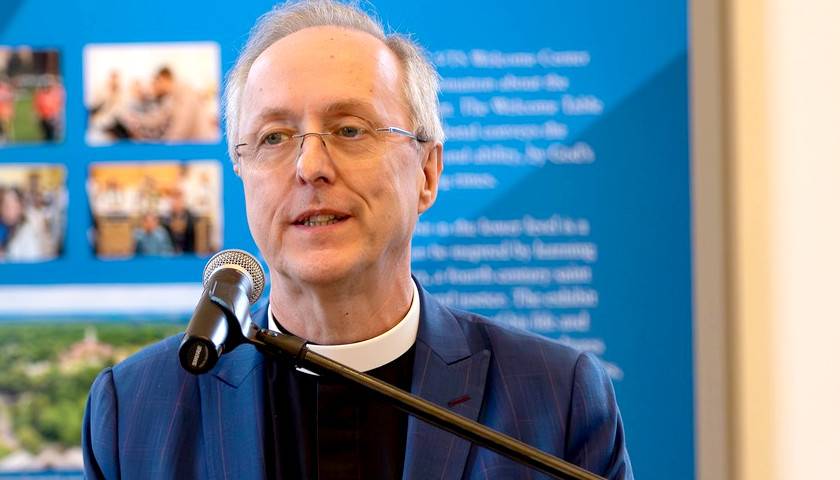by Mary Mobley
The Virginia Theological Seminary renamed six of its buildings this fall in what its leaders say is an effort to address the Episcopal institution’s “legacies of slavery and racism.”
The move by the seminary, which celebrated its 200th anniversary this year, comes as part of a larger effort to ensure the campus “welcomes all,” according to its website.
Along with renaming buildings, the Christian institution’s leaders also have removed portraits of slave owners and established an endowment to make reparations to the descendants of slaves who worked to construct the Alexandria seminary.
In early November, the Board of Virginia Theological Seminary voted to rename six of the school’s buildings. Under the new nomenclature, the seminary’s Madison Hall is now Canterbury Hall, and Johns Hall is now Communion Hall. Additionally, Meade Hall is Descendants Hall, Sparrow Hall is Alumni Hall, Moore Hall is Mission Hall, and Wilmer Hall is Potomac Hall, according to the board decision.
This change will ensure the seminary focuses less on “honoring people” and more on “honoring certain themes,” the Very Rev. Ian Markham (pictured above), dean and president, wrote in a Nov. 13 statement after the vote.
“VTS periodically reviews the names of its buildings,” Markham told The College Fix. “The Seminary decided to review the current building names in the lead up to its Historic Bicentenary,” which the school celebrated all this year.
The board’s decision “focused on changing the names of buildings which were named after people, and replacing them with words with geographical, historical, or Gospel-related themes,” he told The Fix.
But this was not the only reason the buildings were renamed.
Rather, Markham told The Fix: “Some of the people buildings were named after had significant associations with slavery. The decision to rename these buildings reflects the Seminary’s desire to address the legacies of slavery and racism at VTS.”
In his Nov. 13 announcement, Markham told the campus: “It will take some time for us all to be accustomed to these new names. But in the long run, we are continuing to make sure that the campus welcomes all as a place of learning and formation.”
This is not the seminary’s first name change to ensure its campus is “inviting for all.”
In 2019, the school changed the name of Key Hall — named after one of its founders, Francis Scott Key, the author of the “Star Spangled Banner” and a slave owner — to Bicentennial Hall after a renovation project, according to the seminary website.
As part of the renovations, it also removed oil paintings from Scott Lounge, several of which featured former bishops of Virginia, because many of the subjects were slave owners or sympathetic to slavery, the website states.
Most significant, perhaps, was the seminary’s 2019 decision to create a reparations program to address its past participation in “enslaving persons, enacting Jim Crow, and enforcing segregation,” according to the seminary website.
“VTS created the Reparations Program as part of the Seminary’s commitment to recognizing its participation in oppression in the past, and working towards healing and justice in the future,” Markham told The Fix.
Markham said the reparations program provides monetary compensation to the descendants of black workers who labored to construct the seminary for little or no pay.
The reparations endowment now contains $2.7 million, and to-date, it has dispersed approximately $265,000 to 137 descendants, he told The Fix.
“VTS does not believe that there is an amount of money that can compensate for the suffering that took place, but the Seminary does affirm the principle that a form of cash reparations is appropriate for the descendants of people exploited on campus,” Markham said. “VTS believes that the institution is indebted to these individuals who helped to build and maintain the campus, and the reparations program is a modest attempt to recognize the debt that is owed.”
Other Christian colleges and seminaries have considered similar actions.
Earlier this fall, Wheaton College in Illinois, a well-known Protestant Christian higher education institution, removed its third president’s name from its library due to racism allegations, The College Fix reported.
The Princeton Theological Seminary and Southern Baptist Theological Seminary also have faced calls to pay slavery reparations in recent years.
– – –
College Fix contributor Mary Mobley is a student at The Master’s University majoring in political studies with an emphasis in constitutional law.
Photo “Very Rev. Ian Markham” by Virginia Theological Seminary.




